 |
 |
 |
 |
 |
 |
If that wasn’t the best anime episode I’ve seen all year, it sure would be in the conversation.
I don’t say this often – in fact this may very well be the first time I’ve said it – but that episode was Hunter X Hunter caliber shounen. That may be the highest praise I could give Ushio to Tora, but it’s richly earned. This ep was pretty darn magnificent in every respect – overflowing with the “wow” factor that sets the truly great ones apart from the merely superb. And UshiTora is riding a wave of brilliance that’s pretty much locked it into a place on the 2016 Top 10 list, unless that turns out to be the best year anime since at least 2012.
It’s tempting to see Ushio and Tora as anime’s spiritual successor to Hunter X Hunter, but of course this series is actually much older – I think it could even be said (along with Parasyte) to have been a heavy influence on Togashi for H x H. I even see a lot of Gon in Ushio, and vice-versa – something of the same cheerful martial spirit mixed with foolhardy obstinance and stubbornness. This is not a Madhouse series, but MAPPA was born from Madhouse DNA, and many if not most of the key players in this series are veterans of H x H. And like that series, UshiTora makes use of a seemingly endless string of legendary seiyuu – like Monkey D. Luffy herself Tanaka Mayumi as Tokisaka – to give voice to the characters.
In truth I hardly know where to begin heaping praise on this episode, because in spite of being an absolutely crucial fulcrum in the narrative it nailed pretty much everything. The animation, the acting, the pacing – all spot on. And you’re just not going to see exposition done much better than this. The weight of expectations for explanations was heavy here – anime-only viewers have been waiting for this moment since the first days of the series. And not only the premise itself but the way it was exposited was stunning.
I have to praise a couple of the seiyuu specifically. Little-known Hatakana Tasuku has been superb all along as Ushio, but we saw incredible work from Mamoru Miyano here as Giryou. We’re so used to seeing him in his comfort zone and he does it so well that we tend to forget he can play against type with the best of them. His work as the tortured soul who would turn himself into a demon to thrust at Hakumen no Mono’s heart was flawless. And whoever is playing Hakumen no Mono – MAPPA still isn’t telling us – is kicking it big-time. I mean, wow – this is one scary and malevolent performance, whoever she is. It would have been easy to play the character in loud, snarling fashion, but the quiet malevolence in the portrayal elevates the character exponentially as a terrifying force of evil.
As for the story itself, I can only refer to the explanation for how things ended up the way they are and the way it was presented “elegant”. The notion of a beast entwined amongst the pillars holding up Japan is elemental to Shinto belief – the oldest and most important shrine in Kanto is dedicated to the Kami who keeps the beast (in this case, a giant catfish) subdued. In a nation with 20% of the world’s earthquakes it’s hardly surprising that this kind of myth holds so much tractions, and it makes perfect sense as the explanation for the seemingly inexplicable behavior of the female members of Ushio’s family line.
As for the people involved, this story is really one unrelenting tragedy (and I don’t exclude Ushio from that). What Jie Mei and Giryou went through was truly heartbreaking – both of them sacrificing themselves in horrific if totally different ways – but so was observing Ushio as he watches it happen. This boy has so much empathy it’s scary – he feels others’ pain as deeply as if it were he himself were the one being physically and emotionally brutalized. And now he’s surely caught up in it – Jie Mei tells him to “live his life cheerfully”, but he no longer has the option to live his life for its own sake. As his mother and family did, he has to set aside his own concerns and take up the spear so that all of their sacrifices aren’t in vain – even Tora tells him as much.
But of course, it’s not as though Ushio needs to be told, and it’s not as though he’s going to complain about it – and that’s what makes him such a winning and sympathetic protagonist. And it’s not hard to see where Ushio gets it from – Jie Mei threw herself into a forge, and Giryou forged himself into a the shaft of a demonic weapon. His grandmother and mother took their places deep under the sea and took the fall for “protecting” Hakumen no Mono even as they were protecting Japan, though his mother did get a two-year reprieve to conceive and birth Ushio (did Jie Mei somehow guard Hakumen herself during that time, I wonder?). It’s a family with a legacy of tragedy and sacrifice, and almost no one knows the debt they owe to it – and that, as much as anything, makes this such a moving and powerful story.
 |
 |
 |
 |
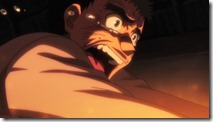 |
 |
 |
 |
 |
 |
 |
 |
 |
 |
 |
 |
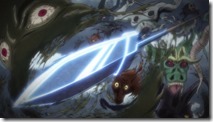 |
 |
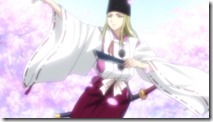 |
 |
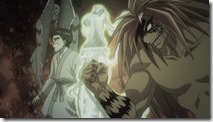 |
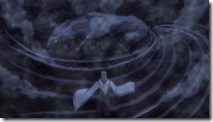 |
 |
 |
 |
 |
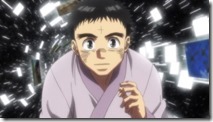 |
 |
 |
 |
 |
 |
 |
 |
 |
 |


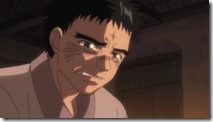
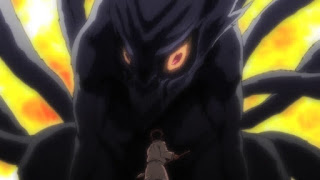
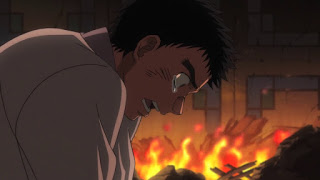
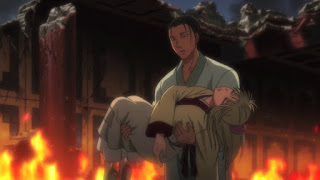
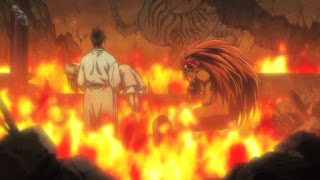
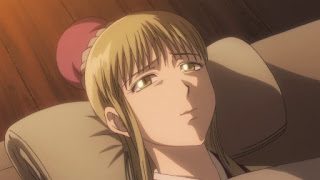
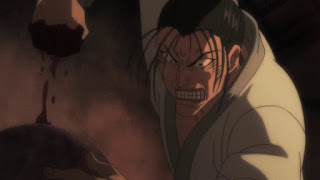
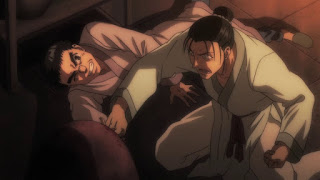
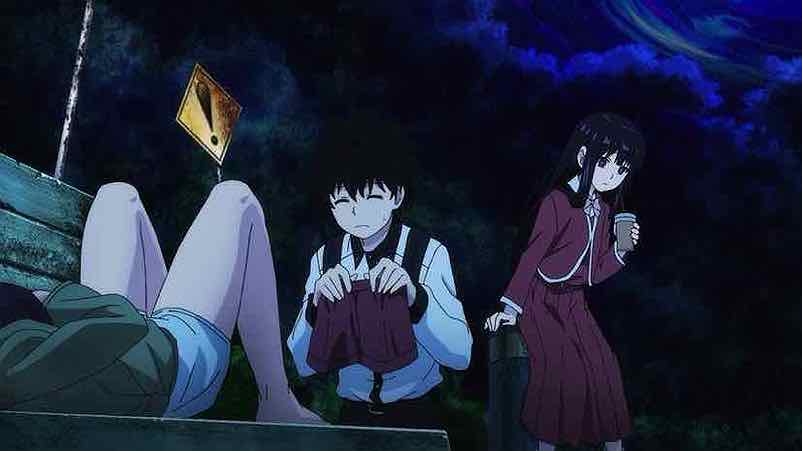
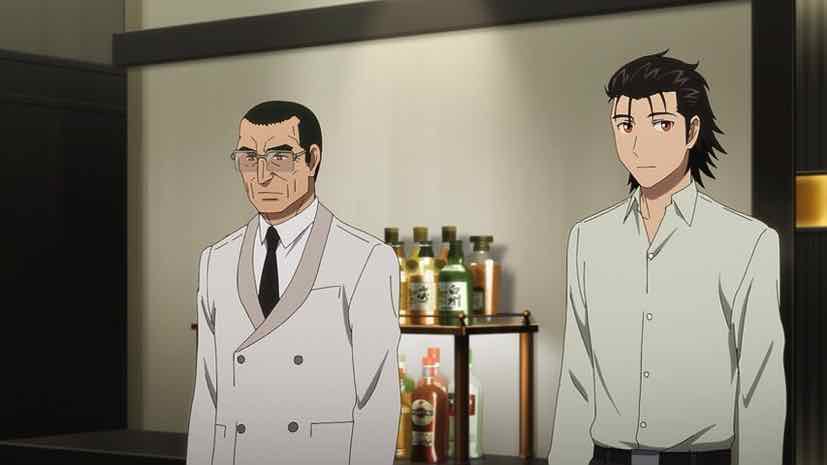
melodic thoughts
November 14, 2015 at 6:32 amPersonally I would not call this the best episode of the year, but it is the strongest episode of the series. If the entire episode had been focused on the backstory of Jie Mei and Giryou, the emotional takeaway could have been stronger. However, it ended fast to move the story along which I thought kind of undercuts the emotional depth.
Putting that aside, I do like how the episode very clearly addresses all of our concerns (Ushio's mother, the spear). This is a show with a very firm head in the plot and there isn't anything to criticise about it. Hope it keeps getting better!
sonicsenryaku
November 14, 2015 at 7:02 amif i have to give praise to anything in this series, it's how ushio deceptively appears to be the typical generic genki male protagonist, just for you to realize that he's this emotionally accepting yet resilient kid who is willing to risk arm and leg to not only make others happy, but to stick to the morals that he holds so dear. Now that may sound like characteristics of a shounen protagonist, but the way it's done with ushio is different. You see how he emotionally connects himself to others and the empathy he feels for his fellow mates. With characters like luffy from one piece, sure we see him stand up for his nakama and those he sees in pain, but you never really connect with his deeds on an emotional level in terms of how he is feeling. With ushio, you do and it makes him that much more relatable. He's so average but because he's so honest and average is what makes him appealing. It's as if the mangaka was subverting the typical shounen protagonist before that even a thing to do nowadays in manga. I guess we are reaching the point where the anime is beginning to show us why the manga is an award winning one
Lapson
November 14, 2015 at 8:38 amAlthough it's not a big issue, Mikado (the 1st successor) is not Ushio's grandmother. Throughout so many centuries, Yuki (Jie Mei's reincarnation) 's bloodline has already branched out. And that's why one of the girls in this show (This has been heavily hinted. It shouldn't be a big spoiler now) is also Yuki's bloodline.
UtT has based on many mythologies and history. In fact, the two forging dark arts mentioned by Giryou are both real Chinese mythologies (in manga he gave more details to the first one). A nine-tailed fox disguising as concubine bringing many Chinese and Japanese dynasties to their ends, is also a famous mythology you might have already known. And in manga when Hakumen traveled to Japan in this episode, she took a ride on the ship of the Japanese ambassador returning homeland, which is a real history event during the Chinese Tang Dynasty. If anime does not skip too many chapters, some Indian mythologies will be included later as well.
Stephen Gooden
November 14, 2015 at 10:13 amLoved every minute of this episode. At one point i had to check how long the episode was but it felt both like a double episode and a single episdoe….Double because so much was crammed into it and it didn't feel rushed at all. Norman episode lenght or shorter because as with every week it finishes too darn quick and i want my next fix now.
More of this please….
Earthling Zing
November 14, 2015 at 4:38 pmFirst half of this episode was absolutely beautiful, really sad and powerful at the same time. I have lingering queries though about why or even whether Tokisaka sent Ushio back in time to explain stuff to him, seems awfully risky to me especially since not much was explained beforehand.
elianthos80
November 15, 2015 at 12:35 pmGreat stuff. Beautifully executed. Especially in the first half the acting, bgm and even the sound effects came together to enhance the story to the most effective: the final words of Giryou as he morphed into the spear punctuated by each forging strike really hit literally and figuratively both Ushio (more high points for his facial expressions and acting combo here) and us watchers.
The exposition in the second half was handed gracefully and lead to another poignant moment at the end with the darling hero grabbing the spear with new awereness and renewed determination, but by necessity it could not match the intensity of what came right before. Still they sneaked in a borderline Moonlight Sonata piano snippet during the Spear's quest&slaughter Chinese years, subtle emotional layering there.
I do wonder how did Jie mei managed to allow Ushio's mother (same eyebrows as his son. Loved that detail ^_^ ) those two years in the world above water… and how she ended up with the 'wonderful man' she conceived him with while we are at it.
Lastly, we got a clue about Tora's (oldest? original?) past identity as possibly the one (once-man?) who took the spear from the deep valley where it had been demonic-bindings-safe-sealed.
P.S.: gotta love the blogger's culture diary links.
Simone
November 18, 2015 at 9:33 pmQuite an excellent episode indeed.
I didn't know about the legend of the pillars of Japan – curiously enough, however, seeing it reminded me of something very similar. I am from Sicily, another land of sea and earthquakes, and we have a very similar legend there. It tells that once upon a time a boy was born who was so good at swimming he could even swim underwater like a fish, without a need to come up for breath. Curious about his skills, the King called upon him, and when he saw what he could do, he told him to swim as deep as he could and tell him what he saw, for he knew all of his kingdom above the sea but little of what was below. The boy went and came back, and told that he saw horrible monsters and fishes without eyes, and that he also found that the island was supported by three pillars – one intact, one chipped, and one outright broken. The King was afraid hearing these words, and told him to go again, to check better the situation. The boy was scared though, thinking that if he went he may not be able return; but the king ordered him to, and so he had to go. Indeed, he never came back; some versions of the story say he simply lost himself in the darkness, while some others say that he stayed under the sea, taking it upon himself to shoulder the weight of the broken pillar and keeping the island afloat.
elianthos80
November 18, 2015 at 9:49 pm@Simone: that's (a variant of ) Colapesce's legend isn' it 😀
Simone
November 19, 2015 at 12:10 amColapesce, yeah :D.